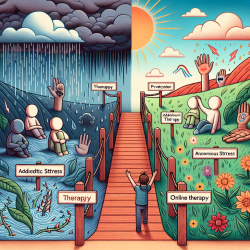The recent pilot study titled "Childhood adversity, mental health, and oxidative stress" has shed new light on the complex relationship between early life challenges and mental health disorders. This research offers valuable insights for practitioners aiming to enhance their therapeutic approaches and improve patient outcomes.
The Impact of Childhood Adversity
Childhood adversity encompasses a range of negative experiences such as abuse, neglect, and household dysfunction. These adverse events are potent risk factors for developing mental health conditions later in life. The study reveals that adolescents exposed to four or more adverse childhood experiences (ACEs) show significantly elevated levels of oxidative stress markers, specifically F2-isoprostanes (IsoPs).
The Role of Oxidative Stress
Oxidative stress is a biological process where an imbalance occurs between free radicals and antioxidants in the body. This imbalance can lead to cellular damage and has been linked to various psychological disorders. The study indicates that elevated IsoPs may serve as a global marker for childhood adversity and internalizing symptoms such as depression and anxiety.
Implications for Practitioners
- Early Identification: Practitioners should consider screening for ACEs during initial assessments to identify at-risk adolescents early.
- Biomarker Utilization: Incorporating oxidative stress biomarkers like IsoPs into routine evaluations could help in identifying subclinical symptoms before they develop into full-blown disorders.
- Tailored Interventions: Understanding the link between oxidative stress and mental health can guide personalized therapeutic interventions aimed at reducing stress-related damage.
- Further Research: Encourage ongoing research to explore the mediating role of oxidative stress in the relationship between childhood adversity and mental health.
A Call for Continued Research
The findings from this pilot study underscore the need for further research with larger sample sizes to validate these results. Future studies should aim to explore whether oxidative stress mediates or moderates the association between childhood adversity and mental health pathology.
The potential outcomes of childhood adversity are severe, making it imperative to develop innovative strategies that delineate how adversity impacts health. By leveraging this knowledge, practitioners can better support children facing toxic stress and mitigate its long-term consequences.










